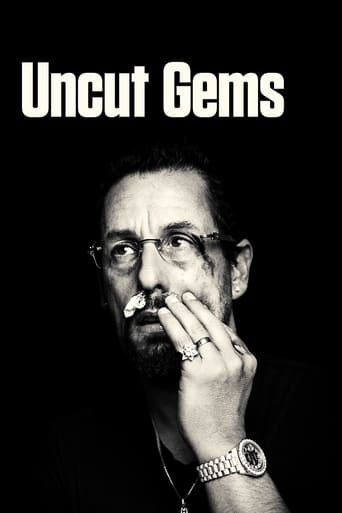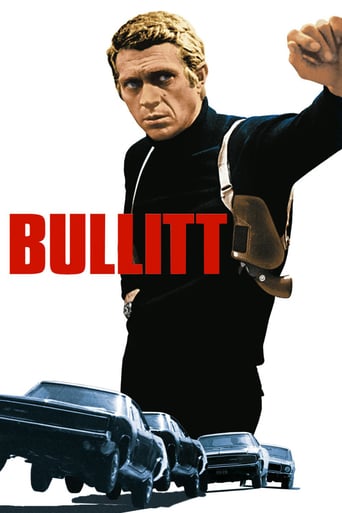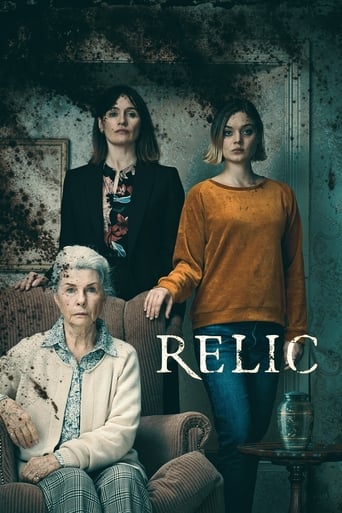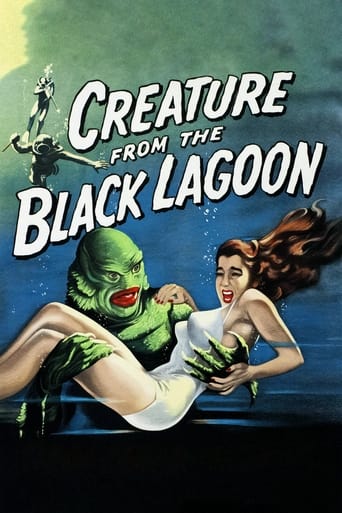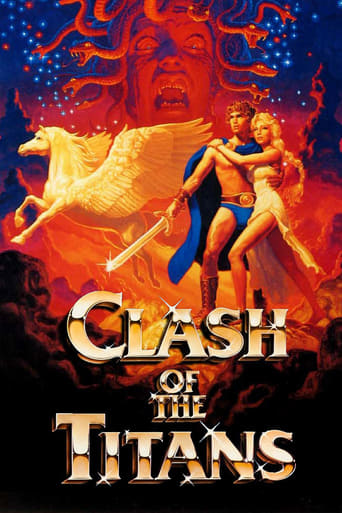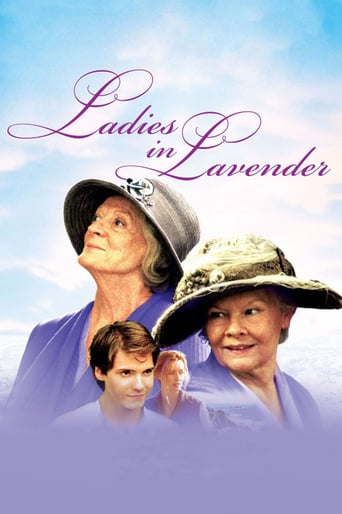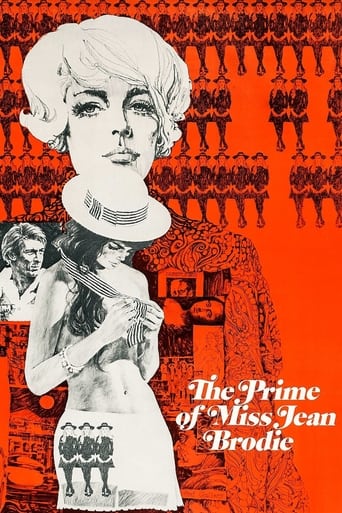


The Prime of Miss Jean Brodie
A headstrong young teacher in a private school in 1930s Edinburgh ignores the curriculum and influences her impressionable 12-year-old charges with her over-romanticized worldview.
-
- Cast:
- Maggie Smith , Robert Stephens , Pamela Franklin , Celia Johnson , Gordon Jackson , Jane Carr , Molly Weir


Similar titles

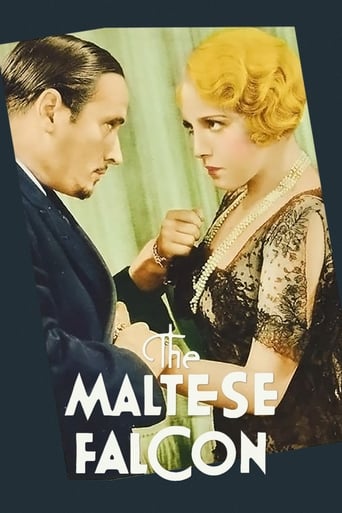



Reviews
Waste of time
To me, this movie is perfection.
just watch it!
In truth, there is barely enough story here to make a film.
Character study of egotistically romantic and ultimately dangerous teacher of young girls set in 1930s Scotland. But stage-bound and why is the school interior relentlessly grey? Worth watching for Maggie Smith.
Dame Maggie Smith is one of the most formidable of British actresses; however, she has a penchant to star in films which hold little appeal to me on paper – from Merchant/Ivory costume pieces to the HARRY POTTER franchise. This is one of the reasons why it has taken me this long to watch her Oscar-winning turn in the film under review (despite having been shown on local TV several years ago), or her other Best Actress nod in George Cukor's TRAVELS WITH MY AUNT (1972; which is a staple of the TCM UK channel); conversely, I am familiar with the film for which she won her second Oscar for Best Supporting Actress, i.e. the star-studded Neil Simon comedy California SUITE (1978) or, for that matter, movies in which her work was similarly shortlisted for recognition like OTHELLO (1965) and Robert Altman's GOSFORD PARK (2001). Incidentally, I was lucky to attend the London Film Festival premiere of Dustin Hoffman's directorial debut QUARTET (2012) which starred Smith, Tom Courtenay, Michael Gambon and Billy Connolly where all four stars were in attendance. Anyway, Smith here plays the titular character of a liberated schoolteacher in an Edinburgh girls' school in 1932 who, while ostensibly teaching her pupils the boring subject of History, instills in them an unconditional appreciation for Art, Life, Love and Politics. The excessive zeal with which Brodie goes about her business has all-round tragic consequences: from her butting heads with (and eventually getting the sack from) headmistress Celia Johnson; her star pupils (including "dependable" Pamela Franklin) being looked down upon by both peers and fellow teachers – especially when it is learnt that Smith is taking them to her boyfriend/music teacher Gordon Jackson's farm on Sundays; a new addition to the fold, a stuttering girl in pigtails, is sufficiently impressed by Brodie's singing of Generalissimo Franco's praises (and Benito Mussolini beforehand) to fatally follow her brother (currently involved in the Spanish Civil War) on the battlefield; Franklin poses in the nude for Art teacher Robert Stephens (although he is a Catholic, married and a father of six children, he carries on a torrid affair with Smith herself) and becomes his lover, etc. Although the smooth running of Brodie's iconoclastic curriculum had already hit a snag when Franklin and Diana Grayson (playing Brodie's favourite pupil Jenny) decide to play a prank on ill-matched lovers Smith and Jackson by penning a sordid love letter that ends on Johnson's desk, it completely deteriorates with the death of innocent Mary McGregor THE PRIME OF MISS JEAN BRODIE, adapted by Jay Presson Allen from Muriel Spark's novel, was somewhat surprisingly released on DVD as part of the "Fox Studio Classics" where it included an Audio Commentary with the film's late director (then a 93-year old) and long-retired actress Franklin; however, as with similar entries in the series that I watched recently – namely TITANIC (1953) and AN AFFAIR TO REMEMBER (1957) – I have not had time to listen to it due to time constraints. Although the acting is generally of a high calibre, I know where film critic Leslie Halliwell is coming from when he says it is "maddeningly acted" since the level of histrionics on display – particularly Smith herself – is sometimes hard to take; still, the film's highlights are the two confrontations between Smith and Johnson (with a dumbfounded Jackson looking on) and the climactic one between Smith and Franklin (whose shocking nude scene might well have cost her an Oscar nomination!) where their tense relationship throughout reaches its final meltdown. For the record, that same year Peter O'Toole was among the year's Oscar nominees for Best Actor for the similarly-set GOODBYE, MR. CHIPS! and actor Stephens was currently wed to Smith in real life. When it comes to awards the film received, it was up for another Oscar – albeit an unaccountable one for Best Song (since the very short tune is only heard once over the closing credits which, incredibly enough, did manage to emerge victorious at the Golden Globes but not Smith or the film itself!); both Franklin and Johnson, then, were also recognized at the BAFTAs. The film also competed, albeit unsuccessfully, at that year's Cannes Film Festival where, yet another film set in a British school – Lindsay Anderson's IF . (1968), was crowned the overall winner.
Dame Maggie Smith's first Oscar-winning film, she is Miss Jean Brodie, a zealous teacher in her prime (30s) at a conservative all-girl boarding school in Edinburgh in 1930s. Whose unorthodox teaching method gathers her a group of "Brodie's gals", whom she proudly acclaims as "crème de la crème", but her battle with the old-fashioned principal (an equally excellent and Celia Johnson), her emotional entanglements with two fellow teachers, Teddy (Robert Stephens) and Gordon (Gordan Lowther), may not be the most distraught concerns, when inside her own clique of "crème de la crème", there are betrayal, questions and decrying after her blind adulation of Fascism triggers one of her girl's death. The film is adapted from Muriel Spark's novel and based on Jay Presson Allen's play, who is also the screenwriter. With indoor settings occupy most of the film narrative, the film is exactly the sort of a warm bed for many breath-stopping two-handers, Smith and Johnson's confrontation is marvellous, and the near-end showdown between Smith and Franklin is even more merciless and astonishing (Pamela Franklin is unbelievably snubbed by the Academy for her brave and searing flair in such a sophisticated role as the teenager Sandy); however Smith's quintessential poignancy has been immaculately demonstrated during the monologue scenes when she is playing slides in the classroom, it's the "crème de la crème" of her long-lasting career. Starts as a farce of the equivalent of a female version of DEAD POETS SOCIETY (1989, a 7/10), but this film goes farther and digs deeper into the dark side of the humanity, the moral criterion is a moot, one could feel sympathy towards Miss Brodie's plight, but her story is not entirely guiltless. Director Ronald Neame has never acquired much fame as a director, but this one is a pure theatrical gem which hopefully has done some justice to him.
"The Prime of Miss Jean Brodie" is on the surface the story of a woman who is too romantic for her own good. And unfortunately she is a teacher at a girl's school in Edinburgh, Scotland in 1936, and she does not realize how popular and dangerous she is.Maggie Smith (who won her first of two Oscars for this performance) plays the part with a verve and style a real Jean Brodie would appreciate, and though Smith was a young woman at the time she also carries an additional burden of the character - not only is Jean a beautiful and enticing woman, but she is getting older and is worried about losing that critical edge in matters of sex that such types fear.She is having affairs with the school's art teacher (Robert Stephens) and another teacher (Gordon Jackson - later "Hudson" in "Upstairs, Downstairs"). Both men want her to marry them, but she is too flirty (she'd say independent) to do so. None of this sits well with the prim head of the school (Celia Johnson - the sad heroine in the classic "Brief Encounter"). It also does not sit well with Ms Johnson that Brodie has developed a minor cult of personality with those girls who have her as a teacher. She constantly refers to the students as "her gails", and boasts she transforms them into young women by opening up their minds.Actually she does open them (to appreciating art, life, love - she encourages them to "experiment" with men), but she is closing them to modern realities. Like many people in Great Britain in the 1930s (like George Bernard Shaw for awhile) she appreciates the firm "let's get things done" attitudes of Fascists on the continent like Mussolini and Franco (she does not mention Hitler, however). She believes them far more superior than the seemingly drab upholders of constitutional government like Stanley Baldwin (the current Prime Minister in 1936) or Ramsay MacDonald (the previous one). That the latter two, in the long run, did less harm than her heroes did is something she never gets a chance to talk about.* [*In the novel and in a longer television version on Masterpiece Theater back in the 1980s, Jean does get her view thrown into her face - a refugee from the continent is invited to tell about how wonderful the Fascist "revival" is there, and the young woman gives Jean and her students an angry earful about how wonderful these leaders really are!] She does have a bad affect on one chubby, somewhat slow girl named Mary MacGregor. Mary is convinced to run off to Spain to fight with her brother. But Mary happens to join Franco's side and is killed. Her brother was fighting Franco.Johnson, in the end, is assisted by her school spies (one is a silent, wormy little woman whose brother is a local Presbyterian church elder), and by one of the girls who seems to come to her senses. In the end Jean is forced to leave the school, and confronts the girl who turned on her, whom she labels an assassin.Actually the event are a little complicated here. The girl is having an affair with Robert Stephens, and sees he still carries his torch for Brodie. Fed up she is determined to get her vengeance on Brodie, and she tells Stephens why he will always be a third-rate painter. She is triumphant over Brodie, but she is aware that her character has been shown to be selfish and sneaky, and will never change. Johnson does get rid of Brodie, but has to be truly under-handed to do so. And Brodie, for all the shame of being forced out by these two still has her own sense of self-worth, comparing herself at the end to her ancestor Deacon William Brodie, the Edinburgh carpenter, cleric, and town councilor who was also a burglar at night, and was hung publicly on a gallows he had constructed.** Brodie might be down for the count as the film ends, but she will survive. Possibly better than her assassin will.[**Deacon Brodie's story is better known to most people than we think. Robert Louis Stevenson's "The Strange Tale of Dr. Jeckyll and Mr. Hyde" was based on this tale.]


